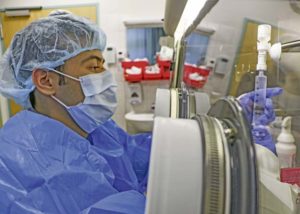
It’s the last stop before going home, back to work or school for many beneficiaries who come to the hospital for medical attention. But the pharmacy is far from a take-a-number operation keeping you from the rest of your day.
Since the early use of herbal medicine to three-dimensional printed pills, pharmacists have worked to help heal the human body for centuries. Pharmacy staff behind counters and windows not only help patients get better, they help save lives.
“It was always interesting to me that a little pill can do so much to a person. That was a starting point where I wanted to learn more about medicine,” said U.S. Army Spc. Richard Martinez, a pharmacy technician at Landstuhl Regional Medical Center’s Inpatient Pharmacy. “I enlisted in the Army for [the pharmacy technician military occupational specialty] and I love it, and enjoy it more than I thought I would.”
Before enlisting in the Army, Martinez went to school for forensic science and started working as a forensic autopsy technician at a mortuary. While performing autopsies he was fascinated by medicinal effects on the body, so he searched for an opportunity to learn more.
“It spans so many levels beyond handing out medications to a patient,” said Martinez, a native of Apopka, Florida. Pharmacy technicians may also deliver anesthesia to operating rooms, injectable medications which can paralyze a person, and adhere to sterile techniques to avoid compromising medication. “It’s interesting how modern medicine can bring you up, drop you down, or keep you steady. I think it’s pretty neat.”
Pharmacists and technicians are celebrated annually every third week of October during National Pharmacy Week, an observance which allows organizations to acknowledge the contributions of pharmacy staff in health care settings.
As an Army pharmacist, Capt. Adam Szabat says something about military pharmacies that sets them apart from their civilian counterparts — pride.
“There are pros, cons and similarities as well,” said Szabat, officer in charge of LRMC’s Inpatient Pharmacy. “While equipment may be about the same, I notice people are very happy to work at LRMC or whatever [military treatment facility]they came from.”
Szabat, a Pittsburgh native, found his calling as a pharmacist after an opportunity in high school to observe a friend’s pharmacist mother at a local hospital. Szabat later realized another passion — to serve in the Army as a pharmacist. After six years of retail pharmacy experience, he felt obligated to serve his country.
“I always had a passion for helping people,” said Szabat. “I saw what [my friend’s mom] did on a day-to-day basis and it was something that interested me. [It was] a lot of chemistry, learning about medications and how they work in the body.”
One of the greatest joys both Soldiers claimed is improving patients’ quality of life.
“I never thought I’d be helping patients’ lives as a pharmacy tech,” said Martinez. “[Pharmacy operations] are very important because we make the medication that gets them through surgery, we mix the medications used in chemotherapy, and we’re helping cancer patients get to remission. Technicians have to be proficient to ensure patient safety.
“The pharmacy is the last place for patients, and we make sure to send them home better, and happier,” said Martinez.


